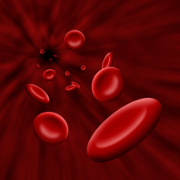Hemophilia is a very rare blood disorder that prevents the blood from clotting. Persons with hemophilia either lack or have low levels of clotting factors. It impacts about 400,000 males worldwide.
It is extremely rare for a female to develop the disorder. About two percent of the population of the United States has hemophilia.
Since a hemophiliac’s blood is unable to clot, injuries such as nosebleeds, scrapes or bruises, which would be very minor to most people, can be extremely serious or even fatal for a hemophiliac. Because of the nature of the disorder, it is usually discovered fairly early – often before the first birthday.
Most people (about 90%) who have hemophilia have Hemophilia A which means that they are missing Clotting Factor VIII. Persons with Hemophilia B have low or missing levels of Clotting Factor IX while persons with Hemophilia C have low or missing levels of Clotting Factor XI. In addition to different types of Hemophilia, the severity of the disorder varies from mild to moderate to severe depending upon the individual clotting factor levels. Most people with Hemophilia A have the severe form of the disease.
Hemophilia cannot be cured but the missing clotting factors can be replaced through Replacement Therapy. Replacement Therapy involves either injecting the missing Clotting Factor directly into the vein or allowing it to drip into the vein intravenously. The type of Clotting Factor injected (VIII or IX) during Replacement Therapy will depend upon whether or not the person has Hemophilia A or B.
Some people elect to have Replacement Therapy on an ongoing regular basis 2-3 times per week. Preventative (prophylactic) Replacement Therapy is done to keep the Clotting Factor levels consistent and prevent bleeding from occurring. Others elect to only have Replacement Therapy when it is actually needed (Demand Therapy). Since Demand Therapy is only provided on an as-required basis, it is obviously a less expensive alternative. The risk of only taking Replacement Therapy on demand is that damage can be caused before therapy can begin. Both forms of Replacement Therapy can be done at home.
In addition to Replacement Therapy, your doctor may recommend that you take a man made hormone called Desmopressin (DDAVP). DDAVP is thought to help lengthen the amount of time which Clotting Factor VIII stays in the bloodstream by helping to cause the release of the von Willebrand factor as well as any stored Clotting Factor VIII.
The type of treatment your doctor may recommend depends on the type and severity of the individual hemophilia disorder. Treatments to stop the bleeding may include:
• Hemophilia A (Mild): DDAVP may be prescribed to raise Clotting Factor VIII levels.
• Hemophilia A (Moderate to Severe) and Hemophilia B: Injection or infusion of Clotting Factor (Clotting Factor VIII for Hemophilia A and Clotting Factor IX for Hemophilia B). (Note: The Clotting Factors may be based on either human blood or may be a recombinant clotting factor which has been engineered.) As indicated above, this may be on demand or preventative Replacement Therapy. DDAVP may also be prescribed prior to dental procedures or surgery in order to lessen the possibility of bleeding.
• Hemophilia C: Persons with Hemophilia C require plasma infusions.
Regardless of the type of hemophilia which you have, it is important to understand the disorder and manage the symptoms. With proper care and treatment, hemophiliacs can live a normal life span.
Sources:
How is Hemophilia treated?, National Heart Lung and Blood Institute, June 2009, http://www.nhlbi.nih.gov/health/dci/Diseases/hemophilia/hemophilia_treatments.html
Hemophilia, 16 May 2009, The Mayo Clinic, http://mayoclinic.com/health/hemophilia/DS00218





Add a CommentComments
There are no comments yet. Be the first one and get the conversation started!